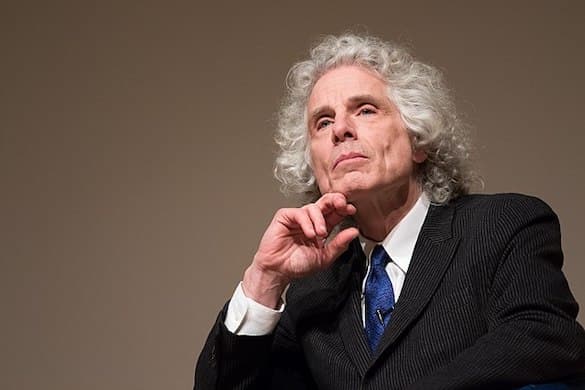‘A New Repression’ Dawns at American Universities, According to Harvard’s Steven Pinker
Pinker hopes to rescue freedom of speech as a cause célèbre of the left.

One of Harvard’s most famous professors fears that the “safeguards from the Enlightenment” that undergird liberty are in peril and “due process has been forgotten” at American universities.
Steven Pinker, the author of “The Language Instinct,” “How the Mind Works,” and “Rationality,” is the Johnstone Family Professor of Psychology and one of the world’s most renowned cognitive scientists. He is a believer that “speech is the only way we can approach the truth,” and he decries “a new repression” on campuses nationwide. He hopes to rescue freedom of speech as a cause célèbre of the left.
That’s a tall order, given the way things have been going in the past generation — during which an intolerant left has made itself felt in some of our finest universities. Mr. Pinker disclosed his worry and that hope in a telephone interview that spotlighted a regime that has taken root on campus and that many Americans would find antithetical to the principles vouchsafed by the Constitution.
The Sun reached out to Mr. Pinker in the wake of the release last month of a documentary titled, “Harvard Canceled its Best Black Professor. Why?” Directed by Robert Montz, the 25-minute film is an indictment of the treatment of a Harvard economics professor, Roland Fryer, who was suspended and disciplined for sexual harassmanet.
The film argues that Mr. Fryer was disciplined less because of claims of harassment than because of quantitative research that took aim at progressive shibboleths.
Mr. Pinker labeled the disciplining of Mr. Fryer a “miscarriage of justice.” He decried Title IX, the 1972 federal law that regulates the kinds of claims made against Mr. Fryer, as a text that can mean almost “anything.” Mr. Pinker explains that without transparent and robust safeguards, “prosecutions in the name of personal vendettas” are all too easy.
Among other hot button subjects, Mr. Fryer’s work indicated that while police use force at a higher rate in interactions with black persons than white ones, there is no evidence that black individuals are subjected to lethal gun violence at a higher rate. Mr. Fryer’s views on education — that raising expectations also raises outcomes — also caused consternation among those wedded to educational orthodoxies.
Accusations of flirtatious text messages to staff working for Mr. Fryer triggered a Title IX review. In 2019, a panel of professors appointed by the dean of Harvard’s faculty, Claudine Gay, went further in its punishments than the Title IX recommendation.
The panel suspended Mr. Fryer for two years, shuttered his Education Innovation Laboratory, and provisionally barred him from advising graduate students for two years. He has since been allowed to resume teaching undergraduate and graduate courses, “subject to certain conditions” set by Ms. Gay. He is still prohibited from supervising students.
Of 32 accusations of sexually inappropriate jokes or comments, Harvard found six to be credible. Nevertheless, Mr. Montz reports that Ms. Gay sought not only to punish Mr. Fryer with the above consequences, but to have his tenure revoked entirely, something that has not been done at Harvard under the modern tenure system.
While Mr. Fryer admitted that he “allowed, encouraged, and participated” in “off-color jokes,” he denied the university’s charge that he “engaged in unwanted sexual conduct toward several individuals.”
Unlike in a court of law, the Title IX process that governed Mr. Fryer’s case, and all others related to sexual harassment, held accusers to the far more lenient “preponderance of the evidence” standard rather than the burden — “beyond a reasonable doubt” — required in court.
While Mr. Pinker was not involved in the case against Mr. Fryer or its fallout, which he considers “disproportionate,” he points to the weaponization of Title IX, which governs cases against faculty, staff, and students, as a primary culprit in the “growing repression” catalyzed by “Kafkaesque” processes and “campus tribunals” that are more akin to “kangaroo courts” than courts of law.
The professor surmises that his colleague’s relatively conservative views made him “an appealing target” for this punitive process. He speculates that had his colleague been, say, an anti-racist theoretician, such a severe punishment would have been “less likely.”
Disclosing to the Sun that he served on a working group aiming to formulate an “anti-bullying” policy at Harvard, Mr. Pinker warned of the danger that this initiative might be used not to protect people but to cancel them.
“If we want a society where truth can be pursued,” he explains, “we need a system in which ideas can be expressed.” Mr. Pinker added that he expects that the policy will contain safeguards against abuse.
Along with other dissenting voices, Mr. Pinker worries that the Title IX regime on college campuses, which holds sway whenever a university accepts federal funding, is a blunt instrument that is easily abused to stifle free expression. He points out how its system of punitive measures can be “used by aggrieved parties,” such as those using the federal law to pursue ideological crusades or personal vendettas.
Part of the problem, Mr. Pinker explains, is that an armada of bureaucrats created under the auspices of both Title IX and Diversity, Equity, and Inclusion initiatives “move laterally” between universities, ironing out variations between campus cultures and practices.
To illustrate, he points to his nearly two decades as a professor at the Massachusetts Institute of Technology, which despite its scientific reputation he found “interchangeable” with ostensibly more progressive institutions.
Mr. Pinker noted that in unfree societies, disputes are resolved not by free and honest debate but rather by recourse to unelected and unaccountable tribunals. History tells us that in the absence of stringent safeguards, the awesome power of institutions to punish individuals is best not taken lightly.

